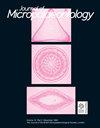东北太平洋亚北极地区第四纪放射虫生物地层学(IODP考察队341站点U1417)和北太平洋生物事件的同步性
IF 1.8
3区 地球科学
Q1 PALEONTOLOGY
引用次数: 8
摘要
摘要综合海洋钻探计划(IODP)的341号探险队从阿拉斯加湾南部取回了更新世和中新世之间的沉积物岩芯。通过提高采样分辨率,对船上更新世放射虫生物地层学进行了改进。来自上层190的178个岩心样本 U1417站点的m CCSF-B(复合岩心深度等级F-B)包含类似于西北太平洋的动物区系元素;例如,在阿拉斯加湾也发现了西北太平洋的三个生物带(即马图亚马真草带、universus Styletractus和aquilonaris Botryostrobus),跨度为1.80–1.13 马,1.13–0.45 马,最后0.45 Myr。根据本研究中使用的年龄模型和船上古地磁反转事件,初步确定东北太平洋刚毛两栖类和日本裂殖虫的首次出现次数分别为1.48和1.30 马。松叶真草的最后一次出现(LO)和松叶真菜的FO都是西北太平洋公认的生物喷口,日期分别为0.80和1.13 马。E.matuyamai的LO是1.05时的同步事件 ± 0.1 Ma在北太平洋,而A.setosa和S.japonicus的FOs分别为1.48和1.30 马的年龄比其他地方发现的要大得多。本文章由计算机程序翻译,如有差异,请以英文原文为准。
Quaternary radiolarian biostratigraphy in the subarctic northeastern Pacific (IODP Expedition 341 Site U1417) and synchroneity of bioevents across the North Pacific
Abstract. Expedition 341 of the Integrated Ocean Drilling Program (IODP) retrieved sediment cores spanning the time interval between the Pleistocene and Miocene from the southern Gulf of Alaska. Onboard Pleistocene radiolarian biostratigraphy is hereby refined by increasing the sampling resolution. The 178 core samples from the upper 190 m CCSF-B (Composite Core Depth Scale F-B) of Site U1417 contained faunal elements similar to the northwestern Pacific; for example, the three biozones in the northwestern Pacific (i.e., Eucyrtidium matuyamai, Stylatractus universus and Botryostrobus aquilonaris) were also recognized in the Gulf of Alaska, spanning 1.80–1.13 Ma, 1.13–0.45 Ma, and the last 0.45 Myr, respectively. Based on the age model that we used in this study and the shipboard paleomagnetic reversal events, the first occurrences (FOs) of Amphimelissa setosa and Schizodiscus japonicus in the northeastern Pacific were preliminarily determined to be 1.48 and 1.30 Ma, respectively. The last occurrence (LO) of Eucyrtidium matuyamai and the FO of Lychnocanoma sakaii, both well-established bioevents in the northwestern Pacific, were dated at 0.80 and 1.13 Ma, respectively. The LO of E. matuyamai is a synchronous event at 1.05 ± 0.1 Ma in the North Pacific, while the FOs of A. setosa and S. japonicus at 1.48 and 1.30 Ma, respectively, are significantly older than what has been found elsewhere.
求助全文
通过发布文献求助,成功后即可免费获取论文全文。
去求助
来源期刊

Journal of Micropalaeontology
生物-古生物学
CiteScore
4.30
自引率
5.00%
发文量
7
审稿时长
>12 weeks
期刊介绍:
The Journal of Micropalaeontology (JM) is an established international journal covering all aspects of microfossils and their application to both applied studies and basic research. In particular we welcome submissions relating to microfossils and their application to palaeoceanography, palaeoclimatology, palaeobiology, evolution, taxonomy, environmental change and molecular phylogeny.
 求助内容:
求助内容: 应助结果提醒方式:
应助结果提醒方式:


